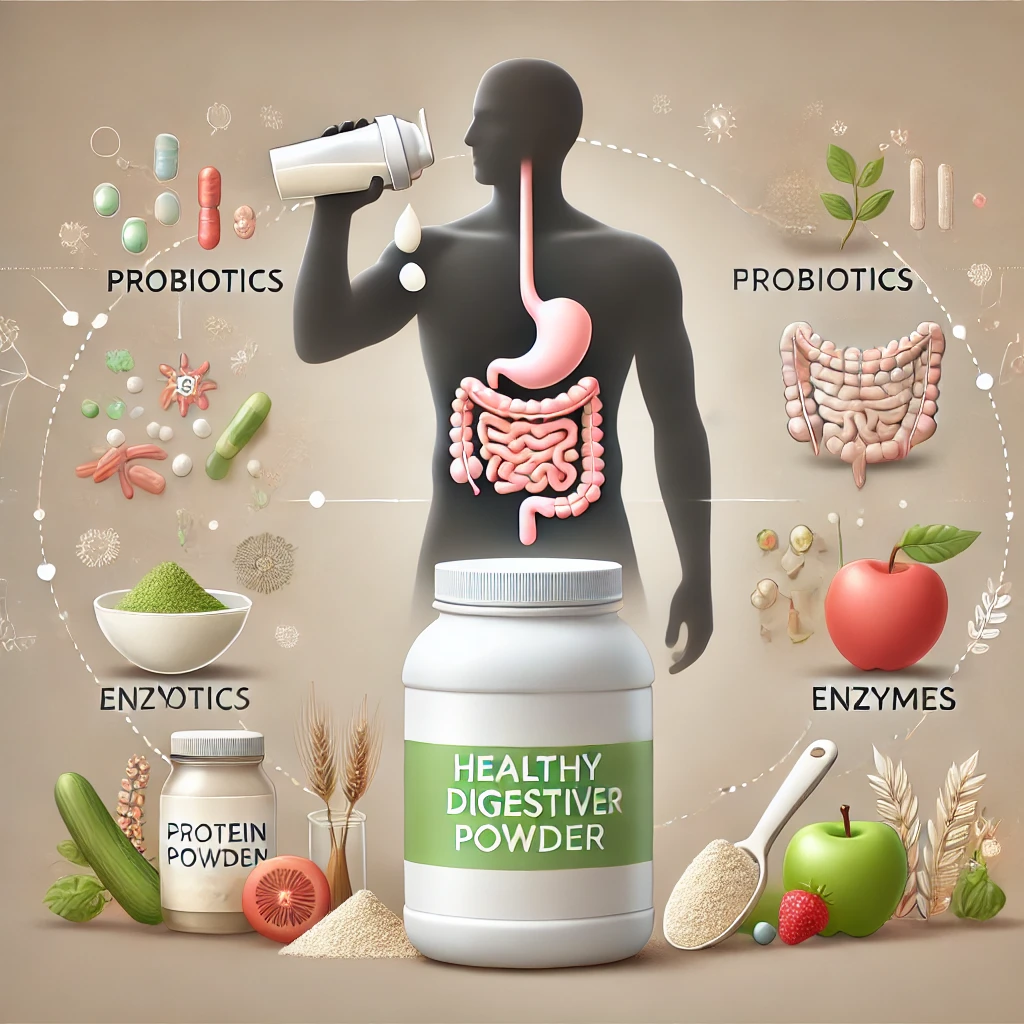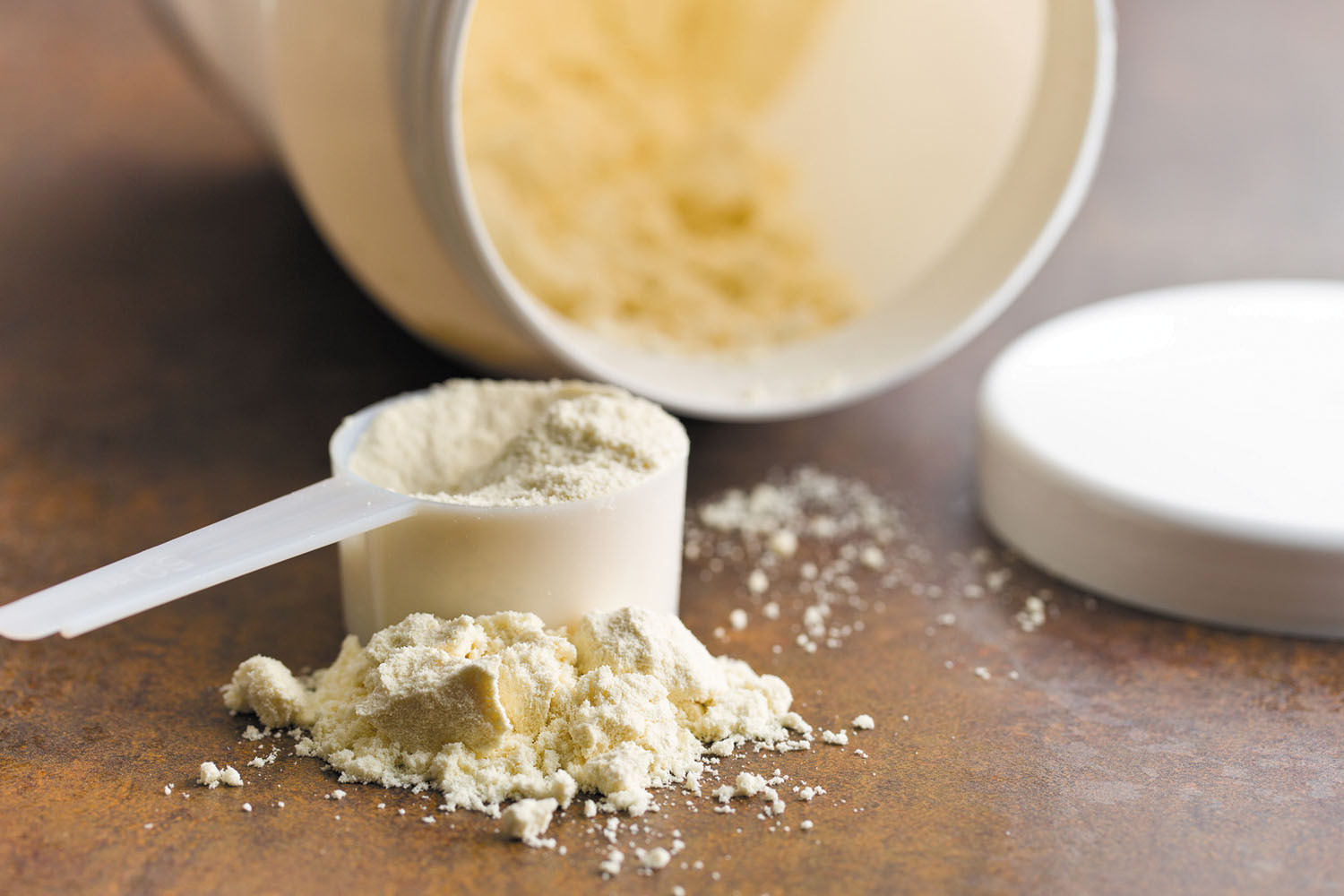Protein powders have skyrocketed in popularity, becoming a staple in fitness and wellness routines. Whether you’re trying to build muscle, lose weight, or supplement your diet, protein powder can be an easy way to boost your intake. But with so many types of protein available, it’s important to consider how they impact your digestive health. Different proteins can affect your gut in unique ways, and understanding these differences can help you make more informed choices.
Table of Contents
Why Digestive Health Matters
Digestive health is critical to overall well-being. Your gut is responsible for breaking down food, absorbing nutrients, and eliminating waste. Poor digestion can lead to uncomfortable symptoms like bloating, gas, and cramps, but it can also affect how well your body utilizes the nutrients you consume. When it comes to protein powders, some types may be harder on your digestive system than others, making it essential to find the right fit for your body.
Types of Protein Powders
There are several types of protein powders on the market, each with unique characteristics:
- Whey Protein – A fast-digesting dairy protein known for its high bioavailability.
- Casein Protein – Another dairy-based protein, but digests more slowly than whey.
- Plant-Based Proteins – Include pea, hemp, and soy proteins, often easier on digestion but contain varying amounts of fiber and anti-nutrients.
- Egg Protein – Derived from egg whites and highly digestible for most people.
- Collagen Protein – Sourced from animal connective tissues, often marketed as gut-friendly.
How Different Protein Powders Affect Digestion

Whey Protein and Digestion
Whey protein is one of the most popular choices due to its quick absorption and muscle recovery benefits. However, it’s derived from milk and contains lactose, which can cause digestive issues for lactose-intolerant individuals. Symptoms like bloating, gas, and cramps are common. However, many whey protein powders are available in isolate form, which contains less lactose and is easier on digestion.
Casein Protein and Digestion
Casein, also derived from milk, digests more slowly than whey. This slow digestion can help provide a steady release of amino acids, but it may also lead to discomfort in some people, especially those with lactose intolerance. Its slow breakdown might make you feel full for longer, which can be good for weight management but potentially problematic if it causes bloating.
Plant-Based Protein and Digestion
Plant-based proteins like pea, hemp, and soy are growing in popularity due to their more sustainable production methods and suitability for people with dairy sensitivities. They tend to be easier on the stomach for those who are lactose intolerant. However, some plant proteins contain anti-nutrients like phytic acid, which can interfere with nutrient absorption and lead to digestive discomfort. Pea protein, in particular, tends to be more gut-friendly, especially when compared to soy, which can be harder for some people to digest.
Egg Protein and Digestion
Egg protein is highly digestible and hypoallergenic for most people. However, individuals with egg allergies should avoid this type of protein altogether. For those without sensitivities, egg protein is often easier to digest than whey or casein.
Collagen Protein and Digestion
Collagen protein, which is often promoted for joint and skin health, is generally well-tolerated by the digestive system. It contains amino acids that support gut health, particularly glycine, which can help reduce inflammation. However, some people may experience bloating when consuming large amounts of collagen.
The Role of Lactose in Digestive Issues
Lactose, a sugar found in milk and dairy products, plays a significant role in digestive issues for many people. This naturally occurring carbohydrate requires the enzyme lactase for proper digestion. However, not everyone produces enough lactase, leading to a condition known as lactose intolerance, which can trigger uncomfortable digestive symptoms.
Lactose Intolerance and Its Prevalence
Lactose intolerance is incredibly common, affecting an estimated 65% of the global population. In some regions, particularly East Asia and parts of Africa, up to 90% of adults may be lactose intolerant. It occurs when the body doesn’t produce enough lactase, the enzyme responsible for breaking down lactose into simpler sugars that can be easily absorbed by the digestive system. Without sufficient lactase, lactose remains undigested in the gut, where it ferments and leads to symptoms such as:
- Bloating
- Gas
- Diarrhea
- Stomach cramps
For individuals with lactose intolerance, consuming dairy products can be uncomfortable, making it essential to manage their intake carefully. Lactose intolerance varies in severity; some people can tolerate small amounts of lactose, while others experience symptoms even with minimal exposure.
Whey and Casein’s Lactose Content and How It Affects Digestion
Whey and casein are two popular forms of dairy-derived protein powders. Both are made from milk, meaning they contain varying amounts of lactose, which can affect digestion for lactose-intolerant individuals.
- Whey Protein: Whey protein is typically available in two forms—whey concentrate and whey isolate. Whey concentrate tends to have a higher lactose content, which can cause digestive discomfort in those with lactose intolerance. On the other hand, whey isolate undergoes more processing to remove a significant amount of lactose, making it more tolerable for people who are sensitive to lactose. However, even whey isolate may contain trace amounts of lactose that could still cause mild issues for highly sensitive individuals.
- Casein Protein: Like whey, casein is also derived from milk and contains lactose. However, it is digested more slowly than whey, which means its lactose content may linger in the digestive system longer, potentially leading to prolonged discomfort in those who are lactose intolerant. Casein is less frequently processed to reduce lactose content, so it’s usually not as well-tolerated as whey isolate for those with lactose sensitivities.
Both whey and casein proteins can offer high-quality nutrition, but for those with lactose intolerance, it’s crucial to choose lactose-free or low-lactose options, like whey isolate, or consider non-dairy alternatives like plant-based protein powders to avoid digestive discomfort.
Protein Powder Additives and Digestive Health
Many protein powders contain additives like artificial sweeteners, preservatives, and thickeners. These ingredients can irritate the digestive tract, causing symptoms such as bloating and gas. For those sensitive to these ingredients, choosing a powder with minimal additives can make a big difference.
Fiber and Digestive Health in Protein Powders

Plant-based protein powders often contain higher amounts of fiber, which can be both beneficial and challenging for digestion. While fiber is excellent for promoting healthy digestion and regularity, consuming too much at once—especially if you’re not used to it—can cause bloating and gas. It’s essential to gradually increase fiber intake to allow your digestive system to adjust.
Digestive Enzymes in Protein Powders
Some protein powders include digestive enzymes like protease (which breaks down protein) and lactase (which helps digest lactose). These enzymes can aid digestion, making the protein easier for your body to process. If you find that protein powders upset your stomach, looking for a product with added enzymes might help reduce discomfort.
Allergies and Sensitivities to Protein Powders
Allergies to protein powders are relatively common, particularly with dairy (whey, casein) and egg proteins. Symptoms like itching, swelling, and digestive upset may indicate an allergy. Always check labels for potential allergens and consider plant-based options if you’re prone to reactions.
How to Choose a Protein Powder for Better Digestion

For those with sensitive stomachs, choosing the right protein powder is crucial. If you’re lactose intolerant, opt for whey isolate or plant-based proteins. Avoid powders with excessive additives, and consider those that include digestive enzymes to aid digestion. Reading ingredient labels is key to avoiding gut irritation.
Signs Your Protein Powder May Be Affecting Your Digestion
Common signs that your protein powder might not agree with your digestive system include bloating, gas, cramps, and even diarrhea. If you notice these symptoms after consuming your protein shake, try switching to a different type of protein or reducing your serving size.
How to Improve Digestion with Protein Powders
For many people, adding protein powder to their diet can lead to digestive discomfort, including bloating, gas, and cramps. However, there are effective strategies to make protein powder easier on the stomach. By making a few adjustments to how you consume protein, you can support better digestion and reduce discomfort.
Strategies for Making Protein Easier on the Stomach
Choose the Right Type of Protein Powder
Not all protein powders are created equal when it comes to digestion. If you’re lactose intolerant or sensitive to dairy, opt for whey isolate (which has less lactose than whey concentrate) or a plant-based protein like pea or hemp. These options tend to be gentler on the stomach. Additionally, collagen protein is often touted for being gut-friendly and easy to digest.
Look for Protein Powders with Digestive Enzymes
Some protein powders are fortified with digestive enzymes like lactase (which helps break down lactose) or protease (which assists in protein digestion). These enzymes can make the protein powder easier to digest and help reduce bloating or gas. If you’re prone to digestive issues, choosing a powder with added enzymes could be a game-changer.
Avoid Protein Powders with Additives
Many protein powders contain artificial sweeteners, thickeners, and other additives that can irritate the digestive system. Ingredients like sucralose, xanthan gum, and inulin may cause bloating or gas in some individuals. To improve digestion, opt for a protein powder with minimal ingredients—ideally one that is free of artificial additives.
Start with Smaller Portions
When introducing a new protein powder into your diet, start with a smaller serving size than recommended. This allows your digestive system to adjust to the new product without being overwhelmed. Once your body adapts, you can gradually increase the amount to meet your nutritional goals without triggering digestive distress.
Mix Protein Powder with Gut-Friendly Ingredients
You can boost digestion by blending your protein powder with digestive-friendly ingredients like ginger, which is known for its soothing effects on the stomach, or probiotic-rich foods like yogurt or kefir. Probiotics support gut health by promoting a healthy balance of bacteria, which can help improve overall digestion.
The Importance of Water and Gradual Intake
Stay Hydrated
Water is essential for proper digestion, particularly when consuming protein powders. When protein is broken down in the body, it generates byproducts like urea, which are filtered through the kidneys. Drinking enough water helps flush out these byproducts, reducing the risk of digestive issues like constipation. Hydration also helps ensure that your digestive system has the necessary fluids to break down and absorb the protein efficiently.
Gradually Increase Protein Intake
Overloading your digestive system with too much protein at once can lead to discomfort, especially if your body isn’t used to high amounts of protein. A sudden increase in protein can overwhelm your gut, causing symptoms like bloating or gas. To avoid this, gradually increase your protein intake over time, allowing your body to adapt. Start with a smaller serving and slowly build up to your target intake over several days or weeks.
By making these adjustments—choosing the right protein, staying hydrated, and gradually increasing your intake—you can enjoy the benefits of protein powder without the unwanted digestive side effects.
Hydration and Protein Digestion
Proper hydration is essential for smooth digestion. Drinking water helps your body break down and absorb the nutrients in protein powders, reducing the risk of bloating and constipation. Ensure you’re drinking enough fluids, especially when consuming high amounts of protein.
When to Seek Medical Advice
If you’re experiencing ongoing digestive issues despite making adjustments to your protein intake, it’s wise to consult a healthcare professional. A nutritionist or dietitian can help you identify the root cause of your digestive discomfort and recommend appropriate changes.
Conclusion
Finding the right protein powder that supports both your fitness goals and digestive health doesn’t have to be a struggle. By understanding how different types of protein affect digestion, you can make informed choices that keep your gut happy and your nutrition on point. Whether you opt for whey, casein, plant-based, or collagen, always listen to your body and choose what works best for you.
Frequently Asked Questions
1. What protein powders are easiest to digest?
Whey isolate and plant-based proteins like pea or hemp tend to be easier on digestion, especially for those with lactose intolerance.
2. Can protein powder cause long-term digestive issues?
While occasional discomfort is common, persistent digestive issues may indicate an intolerance or sensitivity. Consult a healthcare professional if symptoms persist.
3. Should I take digestive enzymes with my protein powder?
Digestive enzymes can help break down protein and reduce discomfort, especially for those with lactose intolerance or sensitivity.
4. How can I avoid bloating from protein powders?
Start with a small serving, drink plenty of water, and choose powders with minimal additives or added digestive enzymes.
5. Is plant-based protein better for digestion than whey protein?
For some people, yes. Plant-based proteins are lactose-free and may contain more fiber, making them gentler on sensitive stomachs.








